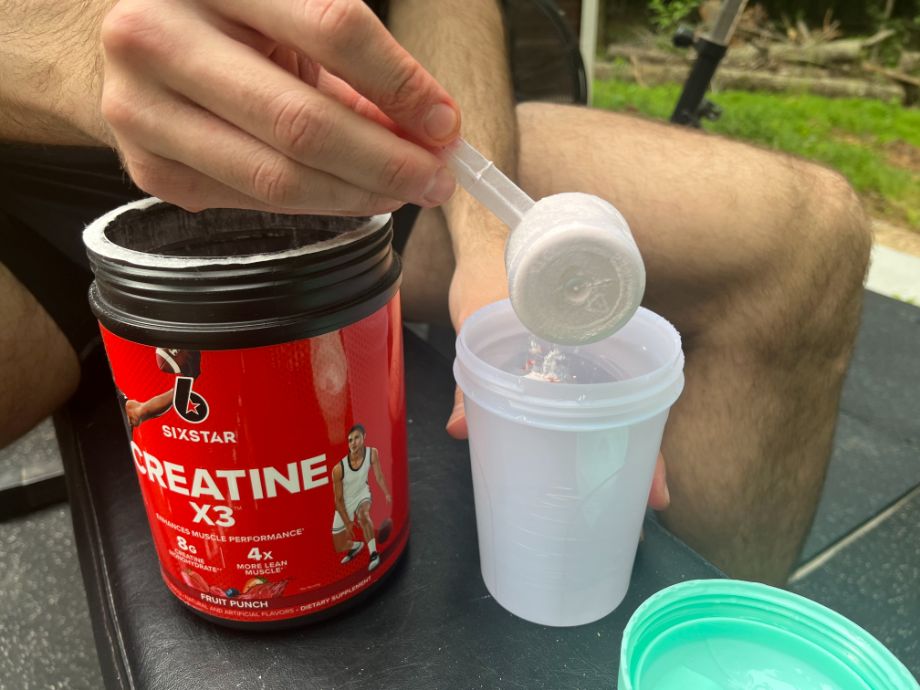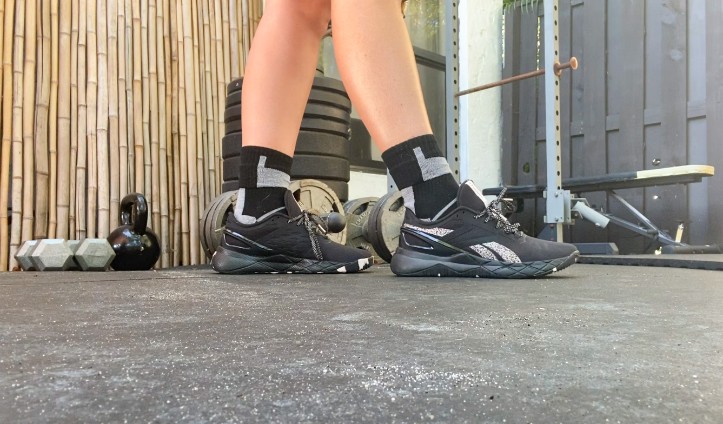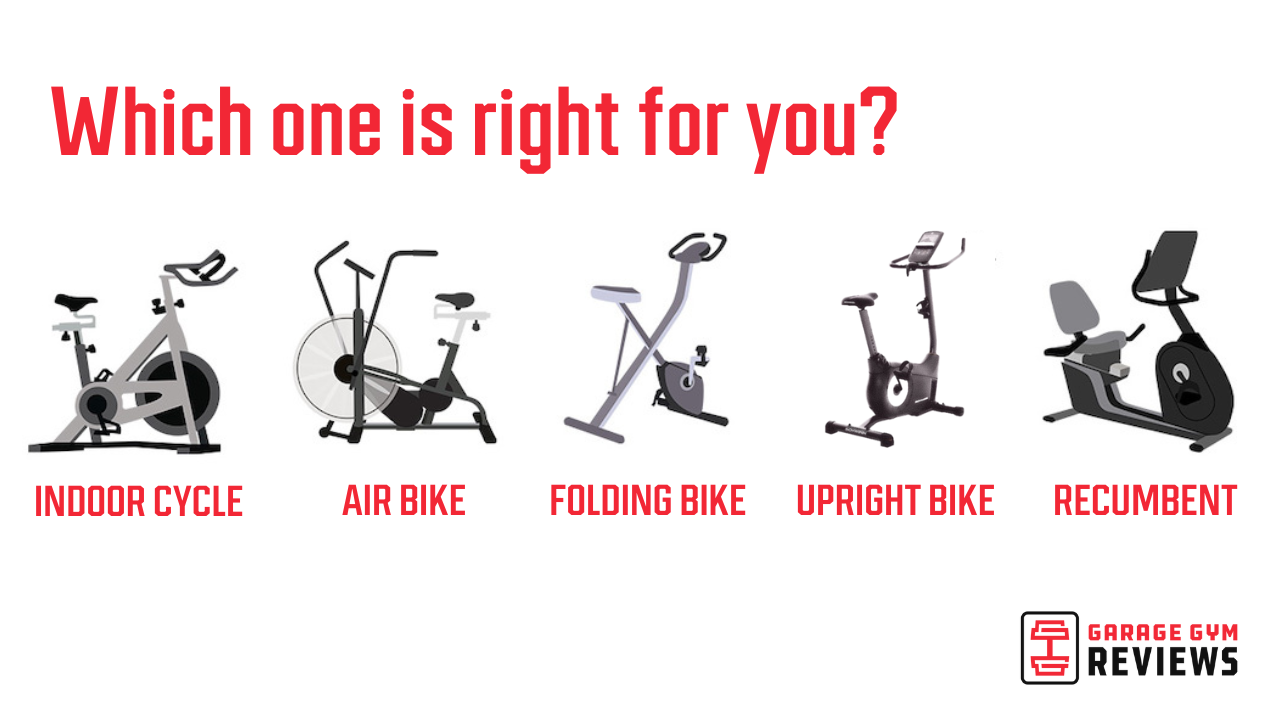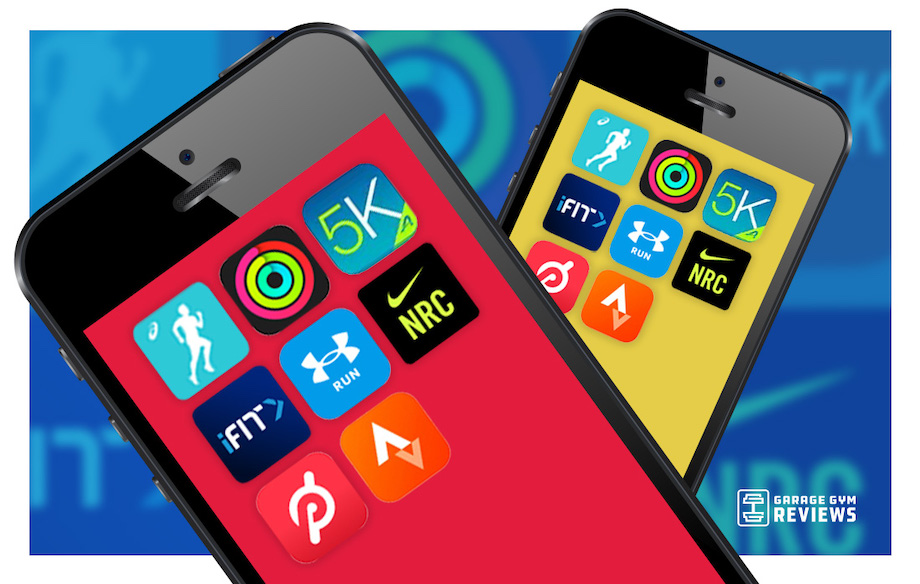Creatine is an amazing ergogenic aid known to improve various fitness performance variables. Alcohol is a toxin with well-documented health detriments. Yet, despite the known health consequences, many (most?) people enjoy having a drink here and there, even people who pay a lot of attention to their health and fitness.
You’re likely already familiar with the negative effects of alcohol. It can make you feel sluggish, give you headaches, dehydrate you, impair your sleep, and really diminish your motivation and energy the next day—not to mention the various physical and neurological effects that take place while you’re intoxicated.
Because of alcohol’s profound effects on the body, it begs the question of how it interacts with supplements for us fitness-minded folks. In this guide, the nutrition experts at GGR are going to specifically look at creatine and alcohol, and whether or not we should have concerns around the two compounds together.
RELATED: Best Creatine Supplements
Medical disclaimer: This article is intended for educational and informational purposes only. It is not intended as a substitute for medical advice. For health advice, contact a licensed healthcare provider.
How Your Body Processes Creatine
Certified nutrition coach (CNC) and GGR Head of Content Nicole Davis explains in our guide “How Long Does Creatine Stay In Your System?” that “When creatine enters the body, creatine transporters travel through the cytosol, providing energy for different processes in the body through a compound called adenosine triphosphate, or ATP.”
According to a 2021 report in the journal Nutrients1, when you consume creatine, it is absorbed through the small intestine into the bloodstream and then filtered through the kidneys, at which point it is either stored as phosphocreatine in muscle tissue or released as creatinine, a waste product, through urine. The majority of creatine winds up stored in the muscles, and small amounts of creatine are also stored in the brain, according to the Journal of the International Society of Sports Nutrition2.
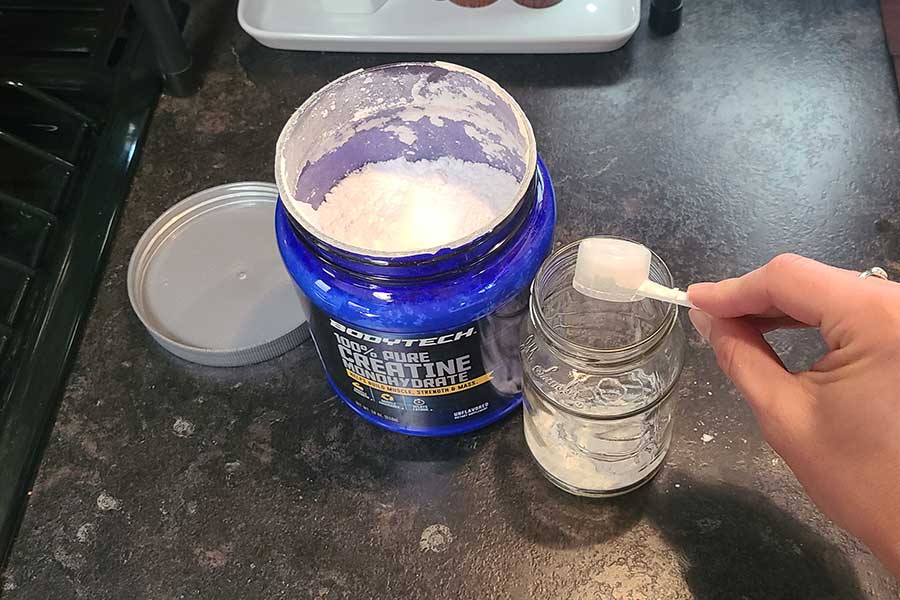
Over time, effective supplementation protocols will saturate muscle stores of creatine, providing your body with the ability to produce more ATP (energy) via anaerobic energy systems.
RELATED: Do You Have to Do a Creatine Loading Phase?
How Your Body Processes Alcohol
Alcohol is something that, as an entire society, we know is pretty bad for our bodies—yet a lot of us drink it, anyway, and sometimes in excess. Recently, in January 2023, the World Health Organization updated its statement on alcohol3 to a very blunt, “No level of alcohol consumption is safe for our health.”
Despite cries of “everything in moderation,” alcohol doesn’t really fit that bill if you’re trying to improve your physical performance or overall health. (It’s not the news I want, either, because I’ll admit I love a cold glass of pinot gris…But facts are facts.)
When you consume alcohol, your body metabolizes it into acetaldehyde4, a highly toxic chemical that damages cells and DNA in your body. This stage of alcohol metabolism mostly occurs in the liver. Acetaldehyde is further broken down into acetate, and acetate is broken down into carbon dioxide and water for excretion.
This process has significant harmful effects on various organs and systems, namely the liver, heart, brain, pancreas, and immune system, according to the National Institutes of Health5.
Creatine and Athletic Performance
The benefits of creatine on physical performance are well-known and well-documented. Creatine6 is a compound that your body creates from the amino acids glycine, methionine, and arginine. Regarding exercise performance, creatine’s role is in the phosphocreatine system.
The phosphocreatine system is an energy pathway that can very quickly provide your body with the energy it needs for substantial work output. For example, the phosphocreatine system drives efforts like a one-rep max clean-and-jerk in weightlifting or a 50-yard sprint.

When there is enough creatine stored as phosphocreatine (creatine with a phosphate molecule) in muscle fibers, it can “donate” its phosphate molecule to adenosine diphosphate (ADP) to made adenosine triphosphate (ATP). ATP is the primary compound driving muscle contraction under anaerobic conditions.
Because of creatine’s important role, creatine supplementation can have significant positive impacts on performance and fitness outcomes. Some of the well-known creatine benefits include:
- Increased muscle mass/increased lean mass
- Increases in strength and power
- Improved sprinting performance
- Enhanced muscular endurance
- Expedited muscle recovery
- Reduced incidence of cramping and dehydration
- Improved cognitive performance
Alcohol and Athletic Performance
In contrast to creatine and its many benefits on athletic performance, alcohol has some well-documented detriments to performance. Yet, race finish lines with free beer for finishers and celebratory popping of champagne after a big win give us the indication that it might not be so bad after all.
Unfortunately, it is. As registered dietitian nutritionist Claire Siekaniec explains in a 2017 report for the National Strength and Conditioning Association7, both short-term and long-term effects of alcohol negatively impact performance.
“From an athletic performance standpoint, the acute use of alcohol can influence motor skills, hydration status, aerobic performance, as well as aspects of the recovery process; consequently, influencing subsequent training and competitions,” sports dietitian Seikaneic writes. “Chronic alcohol use can lead to difficulty in managing body composition, nutritional deficiencies, and depressed immune function, resulting in increased risk of injury and prolonged healing and return-to-play.”
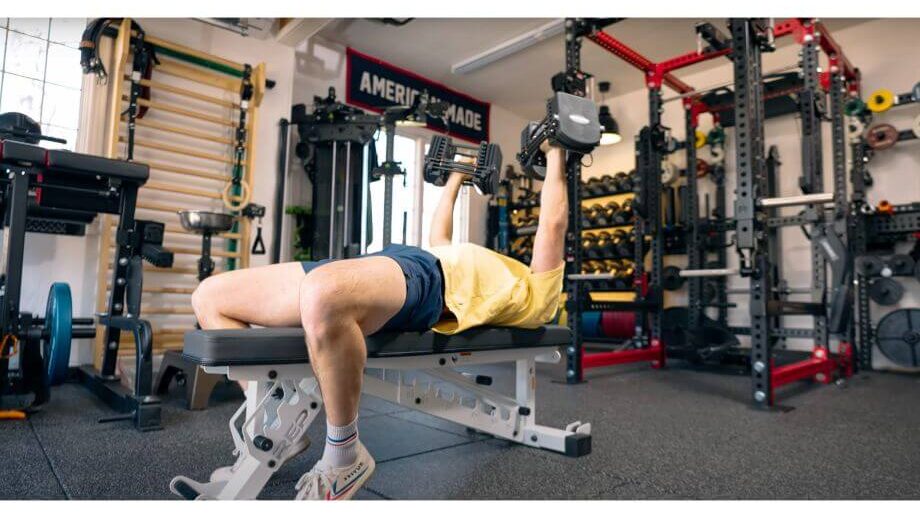
Of course, there is a lot of individuality to account for, and the effects of alcohol—especially long-term effects—are largely dose-dependent. But the gist is, point-blank: Alcohol does not support physical activity.
RELATED: Does Creatine Have Caffeine?
How Alcohol Affects Your Muscles
The way in which alcohol can detrimentally affect your muscles includes, but is not limited to:
- Inhibiting muscle protein synthesis or your ability to build/repair your muscles
- Faster occurrence of muscle fatigue
- Reduction in your body’s ability to absorb key nutrients
- A higher risk of injury
- A general slowing of your metabolism
Destini Moody, RD, CSSD, LD, elaborates further on these points, saying, “Studies show8 that alcohol can cause muscle loss and even hinder muscle gain. This isn’t to say you can’t build muscle while drinking alcohol, but your body becomes less efficient at doing so. Furthermore, alcohol is a toxin that causes inflammation, and chronic inflammation in the body is also a risk factor for inefficient hypertrophy.”
How Alcohol Consumption Affects Creatine Processing
Based on the above information, it’s clear to see that taking creatine and consuming alcohol represent conflicting interests. Creatine is objectively a performance enhancer, while alcohol is the opposite.
So what happens when you consume both?

While there’s limited research on the direct interaction between creatine and alcohol, there are some things we can glean from existing literature.
- Taking creatine might exacerbate hepatic damage associated with excessive alcohol consumption. In animals, some research9 shows simultaneously taking creatine and consuming alcohol increases liver damage associated with alcohol. This study was performed on rats and I’m assuming you’re not knocking back a cocktail with creatine, so I personally wouldn’t worry about the real-world potential of these results until they’re backed by larger-scale human studies.
- Alcohol may have detrimental effects on muscle function and contraction. Research published in Nutrients10 has established relationships between alcohol and impaired muscle function, and the goal of creatine is the opposite—in this case, you’re just not doing yourself any favors by drinking alcohol and hoping creatine picks up the slack.
- Additionally, alcohol might inhibit post-workout recovery from exercise. Evidence around this topic is highly conflicting, with different studies having opposite findings. A 2019 systematic review11 concluded that alcohol consumption following resistance training didn’t seem to have an effect on ratings of perceived exertion or other markers of an extended recovery time, but that it did reduce muscle protein synthesis (the process that builds muscle) and increase cortisol levels.
- Acute alcohol consumption is related to high creatine kinase levels in the blood. Older research from 198412 performed on rats found that alcohol consumption increased creatine kinase13 blood levels, which indicates muscle injury and a toxic effect of alcohol on skeletal muscle.
- This research is very old and was performed on animals, and is only minimally supported by newer studies, such as this study from 199514 (also performed on rats) that has similar findings.
- A 1990 study15 in the Journal of Studies on Alcohol observed increases in creatine kinase in participants who exercised and consumed alcohol—but no significant differences among participants who exercised and did not consume alcohol, so it could not be concluded that alcohol alone increased creatine kinase.
- In 2007, those findings were supported when researchers conducted a study on humans16 and did not find that muscle damage was accelerated by acute alcohol consumption.
- Alcohol consumption is related to lower levels of creatine in the brain. This is perhaps not directly related to physical performance, but worth mentioning. One study17 found that, in older adults, alcohol consumption was linked to reduced creatine levels in the hippocampus. This could have implications for the psychological and neurological aspects of sports performance.
- Alcohol can affect absorption of ingested nutrients. Drinking alcohol impairs your body’s normal functions, including digestion. It may decrease the absorption of nutrients, according to the NIH18. This could have an effect on how creatine is processed and utilized by the body.
- Alcohol can lead to dehydration. Alcohol is a diuretic and it can cause you to become dehydrated if you don’t consume plenty of water and sodium before, during, and after drinking alcohol. Proper hydration is key for the optimal absorption of creatine, so an imbalance of fluid and sodium levels can affect how well your body uses the creatine you consume.
Safety Tips for Combining Creatine and Alcohol
The best advice we can offer when it comes to combining creatine and alcohol is simply—don’t. Destini Moody, RD, CSSD, LD, adds, “No supplement or medication should ever be combined with alcohol due to alcohol’s effects on the liver. Given that alcohol processes all supplements and food we ingest and alcohol disrupts this metabolic process, it poses a danger of toxicity to mix the two.”
That said, if you do choose to combine them, here are a few safety tips to keep in mind:
- Make sure to stay hydrated: Alcohol is a diuretic and can dehydrate you; now, combine that with a sweaty training session, and you may have a recipe for disaster.
- Consider your creatine timing: If you’re taking creatine for energy production, then consuming alcohol—a depressant—within that window may negate those effects.
- Pay attention to your body: If your alcohol intake is causing adverse health effects or you’re experiencing side effects from the combination of creatine and alcohol, reduce or discontinue the amount.
Considerations for Kidney and Liver Conditions
Creatine is primarily filtered through the kidneys and alcohol is primarily processed via the liver. If you have known health conditions affecting either organ, including kidney disease or fatty liver disease, you should talk to your healthcare provider before taking creatine, drinking alcohol, or using both in conjunction.
RELATED: Does Creatine Make You Bloated?
Creatine and Alcohol: Final Thoughts
In simplest terms, creatine is a dietary supplement that acts as a phenomenal ergogenic aid, and alcohol has the opposite effect. Regarding the direct relationship between creatine and alcohol, there are a lot of maybes.
What we do know is that alcohol consumption definitely affects hydration status and nutrient absorption, which may alter how your body digests and uses creatine.
The bottom line? You may not get the most out of your creatine supplements if you drink alcohol on a regular basis, especially in excess. However, an occasional alcoholic drink is not going to undo any gains you’ve experienced that are attributable to creatine supplementation.
And…this should go without saying, but please don’t mix creatine with your next cocktail.
Experts Who Contributed to This Article
Creatine and Alcohol: FAQs
How much alcohol is safe to drink?
Evidently, we can all stand to decrease our alcohol intake. According to the World Health Organization (WHO), no amount of alcohol is safe for human consumption. There are well-known risks to physiological and psychological health related to any level of alcohol consumption, despite the common argument that “a little bit of red wine has health benefits.”
The Dietary Guidelines for Americans19 from the U.S. Department of Agriculture and the U.S. Department of Health and Human Services encourage adults to refrain from consuming alcohol. However, the guidelines state that those who choose to drink should refrain from consuming more than one drink per day (for females) and more than two drinks per day (for males) on days when alcohol is consumed—that last bit is important because you can’t average out your drinks from a week.
How long do you have to wait to take creatine after drinking?
There are no established guidelines around joint alcohol and creatine consumption. However, because of research that shows creatine to potentially exacerbate liver damage associated with alcohol consumption, it’s best to avoid taking them together.
Is creatine good for a hangover?
Because creatine and alcohol both alter the way your body stores water, taking creatine when you are hungover might actually make things worse. You’re better off drinking water with added electrolytes, eating a nutritious meal, and sleeping it off.
How much creatine should I take?
To optimize the beneficial effects of creatine monohydrate, like new muscle growth and improved high-intensity exercise performance, take the clinically recommended dose of 3 to 5 grams of creatine per day.
These statements have not been evaluated by the Food and Drug Administration. This product is not intended to diagnose, treat, cure, or prevent any diseases.
References
- Kreider RB, Stout JR. Creatine in Health and Disease. Nutrients. 2021;13(2):447. Published 2021 Jan 29. doi:10.3390/nu13020447
- Kreider RB, Kalman DS, Antonio J, et al. International Society of Sports Nutrition position stand: safety and efficacy of creatine supplementation in exercise, sport, and medicine. J Int Soc Sports Nutr. 2017;14:18. Published 2017 Jun 13. doi:10.1186/s12970-017-0173-z
- World Health Organization (WHO). No level of alcohol consumption is safe for our health.
- National Institute on Alcohol Abuse and Alcoholism. Alcohol Metabolism. Alcohol’s Effects on Health: Research-based information on drinking and its impact.
- National Institute on Alcohol Abuse and Alcoholism. Alcohol’s Effects on the Body. Alcohol’s Effects on Health: Research-based information on drinking and its impact.
- National Center for Biotechnology Information. PubChem Compound Summary for CID 586, Creatine. https://pubchem.ncbi.nlm.nih.gov/compound/Creatine.
- Siekaniec, C. The Effects of Alcohol on Athletic Performance. National Strength and Conditioning Association.
- Simon L, Jolley SE, Molina PE. Alcoholic Myopathy: Pathophysiologic Mechanisms and Clinical Implications. Alcohol Res. 2017;38(2):207-217. PMID: 28988574; PMCID: PMC5513686.
- Marinello PC, Cella PS, Testa MTJ, et al. Creatine supplementation exacerbates ethanol-induced hepatic damage in mice. Nutrition. 2019;66:122-130. doi:10.1016/j.nut.2019.05.004
- Vella LD, Cameron-Smith D. Alcohol, athletic performance and recovery. Nutrients. 2010;2(8):781-789. doi:10.3390/nu2080781
- Lakićević N. The Effects of Alcohol Consumption on Recovery Following Resistance Exercise: A Systematic Review. J Funct Morphol Kinesiol. 2019;4(3):41. Published 2019 Jun 26. doi:10.3390/jfmk4030041
- Spargo E. The acute effects of alcohol on plasma creatine kinase (CK) activity in the rat. J Neurol Sci. 1984;63(3):307-316. doi:10.1016/0022-510x(84)90153-9
- National Library of Medicine. Creatine Kinase. MedlinePlus.
- Amaladevi B, Pagala S, Pagala M, Namba T, Grob D. Effect of alcohol and electrical stimulation on leakage of creatine kinase from isolated fast and slow muscles of rat. Alcohol Clin Exp Res. 1995;19(1):147-152. doi:10.1111/j.1530-0277.1995.tb01483.x
- Clarkson PM, Reichsman F. The effect of ethanol on exercise-induced muscle damage. J Stud Alcohol. 1990;51(1):19-23. doi:10.15288/jsa.1990.51.19
- Poulsen MB, Jakobsen J, Aagaard NK, Andersen H. Motor performance during and following acute alcohol intoxication in healthy non-alcoholic subjects. Eur J Appl Physiol. 2007;101(4):513-523. doi:10.1007/s00421-007-0511-y
- Demnitz N, Topiwala A, Zsoldos E, et al. Alcohol consumption is associated with reduced creatine levels in the hippocampus of older adults. Psychiatry Res Neuroimaging. 2020;295:111019. doi:10.1016/j.pscychresns.2019.111019
- National Institute on Alcohol Abuse and Alcoholism. Alcohol and Nutrition. No. 22 PH 346 October 1993.
- USDA, USDHHS. Dietary Guidelines for Americans, 2020–2025.


